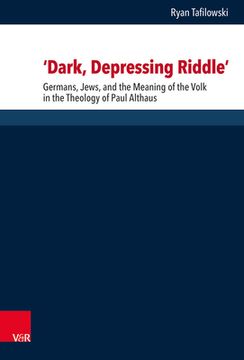Compartir
'dark, Depressing Riddle': Germans, Jews, and the Meaning of the Volk in the Theology of Paul Althaus (en Inglés)
Ryan Tafilowski
(Autor)
·
Vandenhoeck & Ruprecht
· Tapa Dura
'dark, Depressing Riddle': Germans, Jews, and the Meaning of the Volk in the Theology of Paul Althaus (en Inglés) - Tafilowski, Ryan
90,25 €
95,00 €
Ahorras: 4,75 €
Elige la lista en la que quieres agregar tu producto o crea una nueva lista
✓ Producto agregado correctamente a la lista de deseos.
Ir a Mis ListasSe enviará desde nuestra bodega entre el
Martes 28 de Mayo y el
Jueves 30 de Mayo.
Lo recibirás en cualquier lugar de España entre 1 y 5 días hábiles luego del envío.
Reseña del libro "'dark, Depressing Riddle': Germans, Jews, and the Meaning of the Volk in the Theology of Paul Althaus (en Inglés)"
At the twilight of the Weimar Republic, politicians, scientists, and theologians were engaged in debates surrounding the so-called "Jewish Question." When the Nazi Party came to power in 1933, these discussions took on a new sense of urgency and poignancy. As state measures against Jews unfolded, theological conceptions of the meaning of "Israel" and "Judaism" began to impact living, breathing Jewish persons.In this study, Ryan Tafilowski traces the thought of the Lutheran theologian Paul Althaus (1888-1966), who once greeted the rise of Hitler as a "gift and miracle of God," as he negotiated the "Jewish Question" and its meaning for his understanding of Germanness across the Weimar Republic, the Nazi years, and the post-war period. In particular, the study uncovers the paradoxical categories Althaus used to interpret the ongoing theological significance of the Jewish people, whom he considered both an imminent threat to German ethnic identity and yet a mysterious cipher by which Germans might decode their own spiritual destiny in world history.Sketching the peculiar contours of Althaus' theology of Israel, this study offers a fresh interpretation of the Erlangen Opinion on the Aryan Paragraph, which is an important artifact not only of the Kirchenkampf, but also of the complex and ambivalent history of Christian antisemitism. By bringing Althaus into conversation with some of the most influential theologians of the twentieth century-from Karl Barth and Emil Brunner to Rudolf Bultmann and Dietrich Bonhoeffer-Tafilowski broadens the scope of his inquiry to vital questions of political theology, ethnic identity, social ethics, and ecclesiology. As Christian theologians must once again reckon with questions of national self-understanding under the pressures of mass migration and resurgent nationalisms, this investigation into the logic of ethno-nationalist theologies is a timely contribution.

